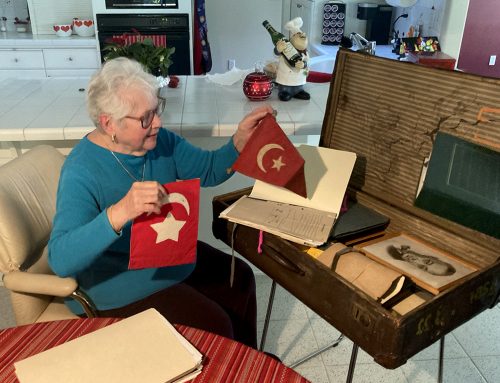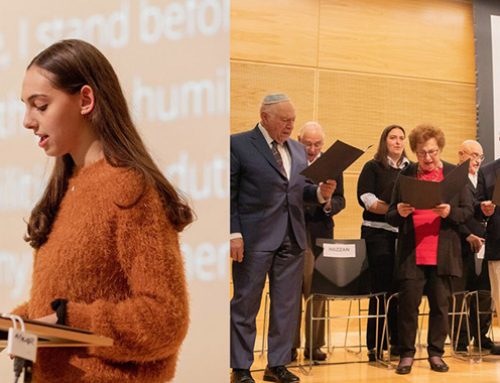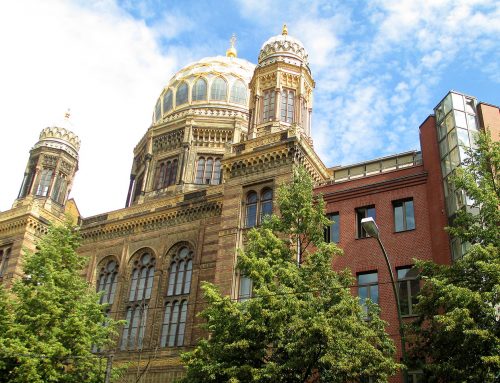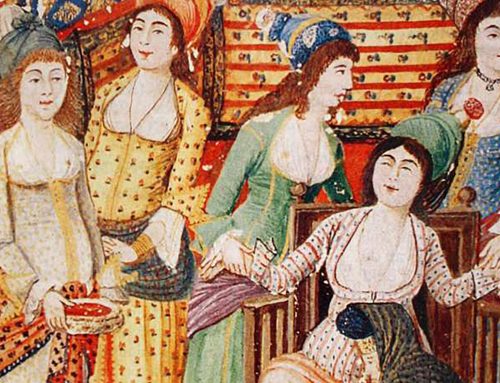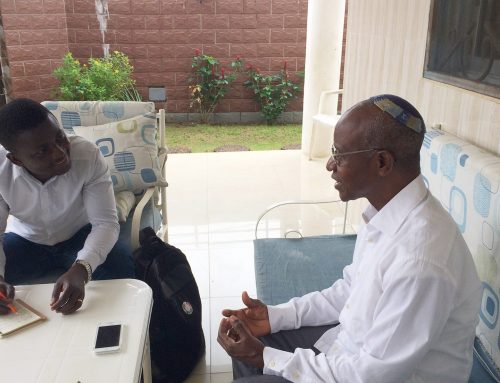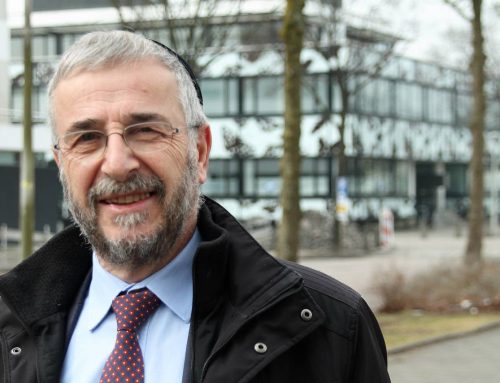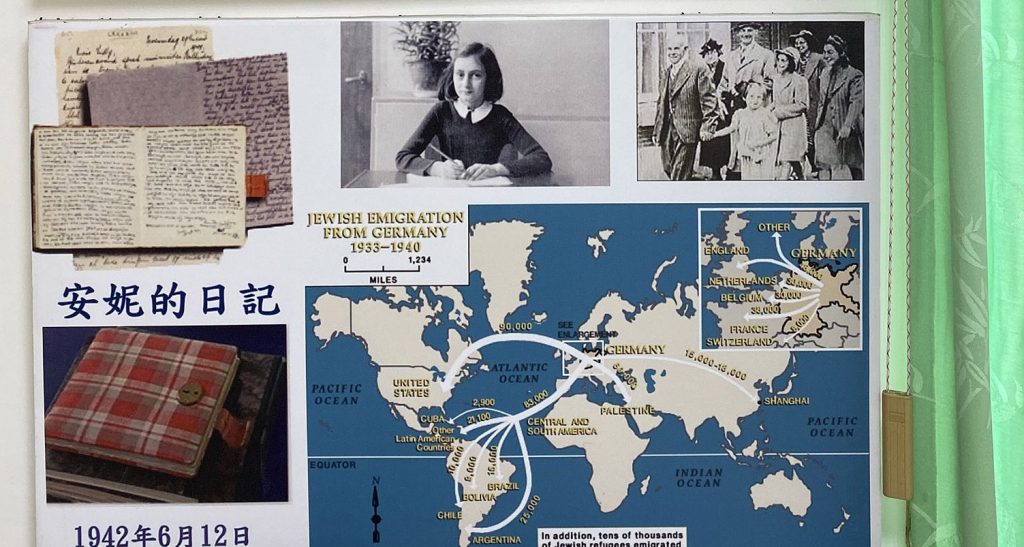
A portion of the Anne Frank exhibit in the Taiwan Holocaust Museum in Tainan, Taiwan
By Eryk Waligora
With the recent rise in global anti-Semitism, critical learning about the potential consequences of anti-Jewish ideas is more important than ever. Holocaust-related museums, cultural sites, and other education centers have been established in several East Asian countries within the last two decades. Although this region of the world experiences a comparatively low rate of anti-Semitism, there is a recent shift towards educating the population about the Holocaust.
The Shanghai Jewish Refugees Museum and Hong Kong Holocaust and Tolerance Centre in China, and the small-scale Fukuyama Holocaust Education Centre in Japan, are all growing in popularity. In Taiwan, both government and non-government organizations are working to inform the public about the tragedy and consequences of the Holocaust — an initiative that has special resonance given Taiwan’s own history.
The Taiwan Holocaust Museum
On the second floor of a Christian church in the southern city of Tainan, Taiwan, is the Taiwan Holocaust Museum. Established in 2002 by the church’s founder, Pastor Chou “Joe” Cho, this museum is dedicated to telling the story of the Holocaust and promoting the concept of world peace.
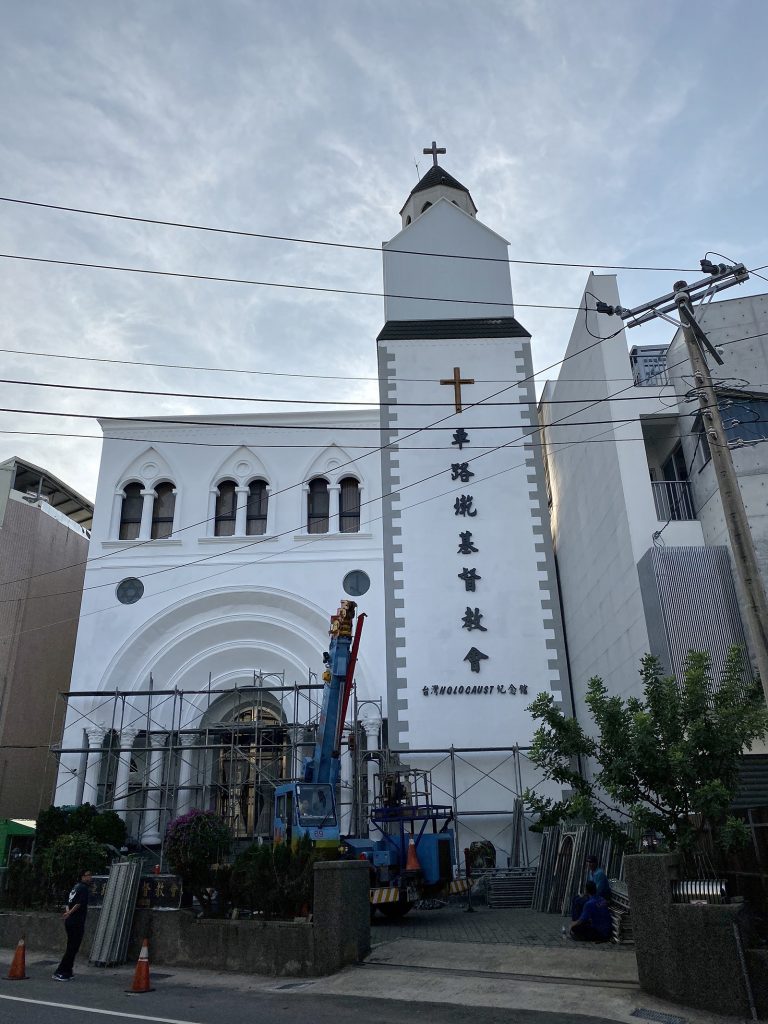
The church where the Taiwan Holocaust Museum is located in Tainan, Taiwan. Photo by Eryk Waligora.
Upon entering the museum, an inscription on the wall reads “忘記仇恨,彼此相愛. 杜絕戰爭,崇尚和平 / Forget hatred and love each other. Put an end to war and advocate peace.”
One of the most apparent features of this museum is that it is intended for the local population. Nearly all the content is displayed in Chinese. Structurally, the museum is made up of a series of small individually themed rooms. Visitors can learn about Anne Frank, the concentration camps, and the Nazi ideology that lead to the murder of 6 million Jews.
Despite much of the inherently grim subject matter, the museum itself almost has the feeling of a sacred shrine, but one that is open to the public and ready to educate. The museum not only exhibits Holocaust history, but explains the formation of the State of Israel and aspects of Jewish culture such as holidays and festivals, procedures for a traditional Jewish wedding, and what kippahs (or yarmulkes, head coverings typically worn by men) are used for.
This design allows for greater context surrounding Jewish people, by not limiting their history to a tragedy but by celebrating Jewish culture in greater depth.
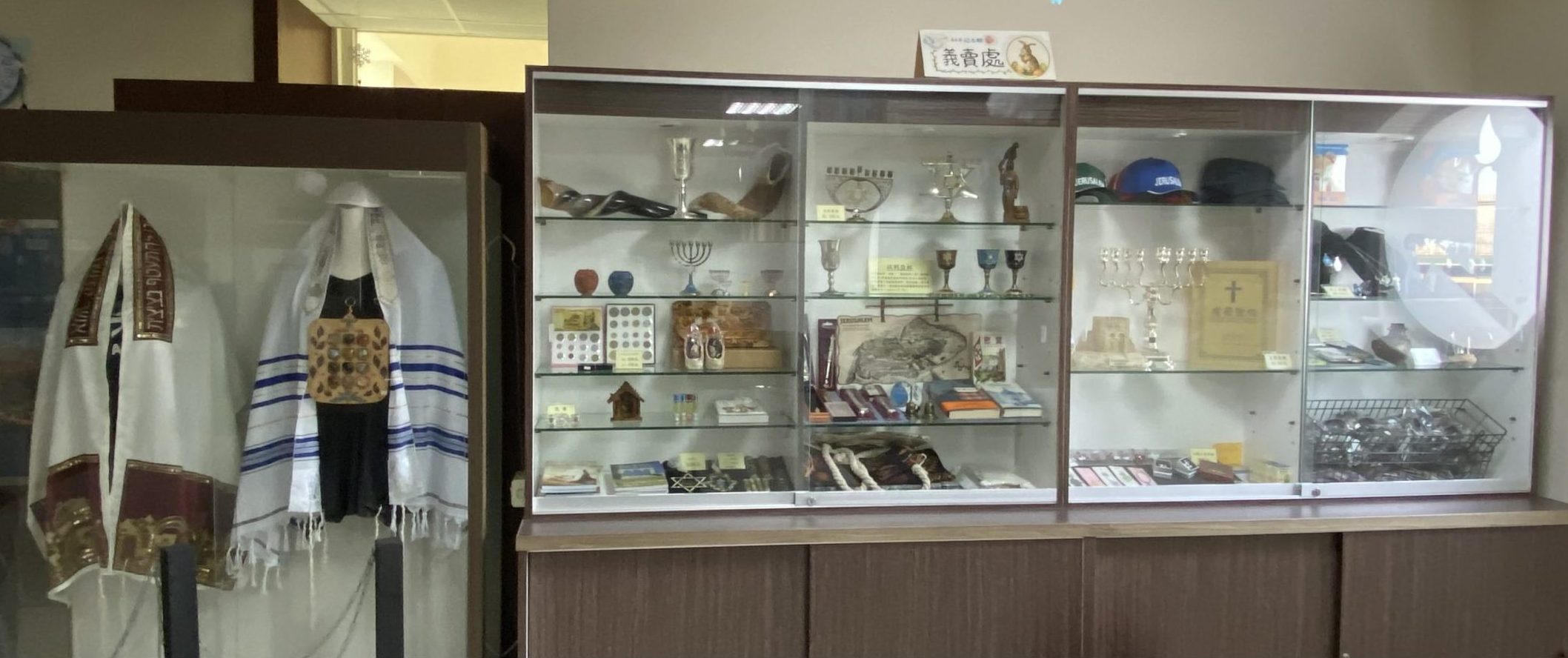
Jewish cultural items on display at the Taiwan Holocaust Museum. Photo by Eryk Waligora.
Most of the historical pieces are donated from the Fukuyama Holocaust Museum in Japan, and from Israel, where Pastor Joe and his congregation maintain strong ties with local religious organizations. A fascinating and more detailed description of the museum can be read in Israeli writer Dror Mishani’s 2007 article “State or State of Mind?”, and a virtual tour can be viewed in a video by Israeli news channel i24NewsEnglish.
Why is Holocaust education important in Taiwan? For this we have to understand a little about Taiwan and its relationship to Judaism.
Why Holocaust history matters in Taiwan
Immediately following World War II and an end to Japanese occupation in China, a civil war in China resumed between the Nationalists and the Communist Party under Mao Zedong. With the eventual Communist takeover of the mainland, the Nationalists retreated across the Taiwan Strait, and in 1949 formally transferred their government to the formerly colonized territory of Taiwan, a large island off the eastern coast of China. In the early 1950s, during the Korean War, Taiwan became a strategic military base for the United States, bringing a sizable population of Jewish servicemen to the island.
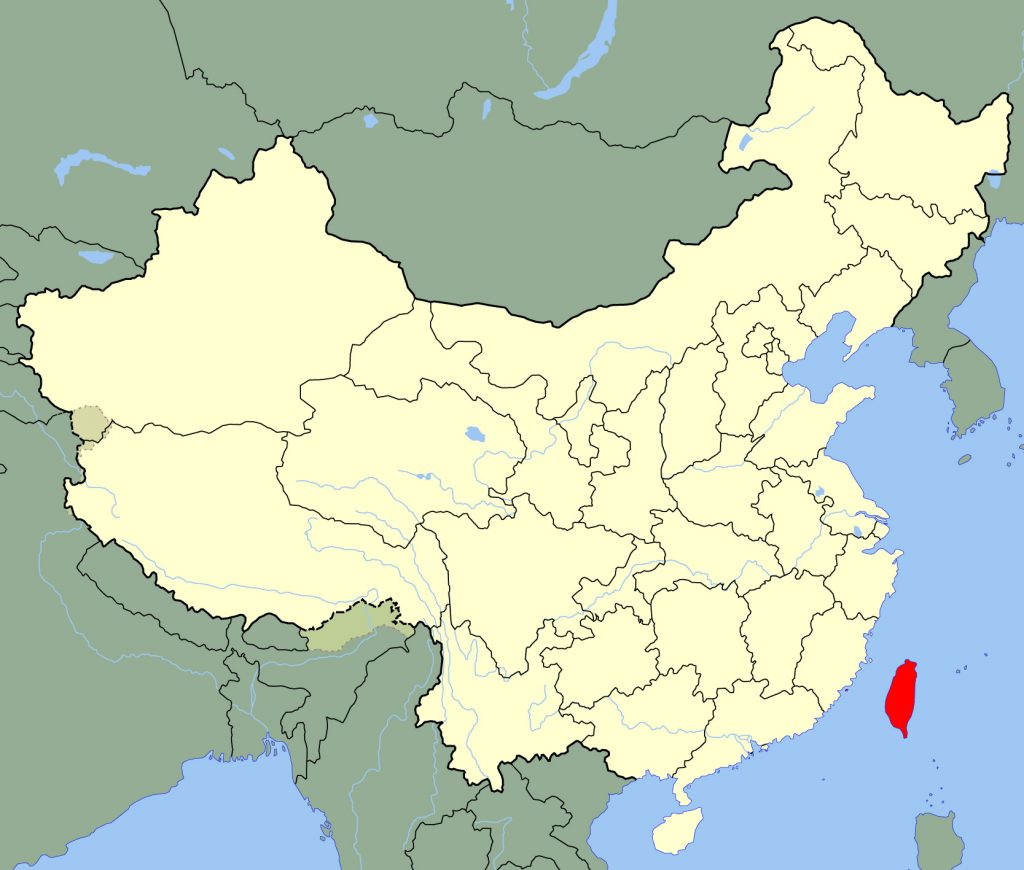
The island of Taiwan (pictured in red), off the eastern coast of China
While Israel does not officially recognize Taiwan as separate from China, it operates a pseudo-embassy there through the Israel Economic and Cultural Office in Taipei. To organize this growing Jewish community, the first synagogue was established in 2011 under Taiwan’s only rabbi, Rabbi Shlomi Tabib, of the Taipei Jewish Center.
While exposure to Judaism is increasing in Taiwan, many Taiwanese people remain unfamiliar with Jewish culture and history. Unfortunately, this has led to some disturbing incidents over the years, including a Taiwanese political party using an image of Hitler in an ad campaign and the establishment of a concentration camp-themed diner. In 2017, a private high school in Taiwan produced a bizarre display with students dressed in Nazi uniforms marching around campus. This event prompted the resignation of the school’s principal and a formal apology to the Jewish people from Tsai Ing-wen, Taiwan’s president.
However, as academic experts based in Taiwan note, these incidents usually stem from ignorance rather than anti-Semitism or neo-Nazism. Rabbi Tabib and Asher Yarden, Israel’s representative with the IECO in Taipei, have echoed this analysis in interviews, agreeing that it all boils down to “ignorance.”
Remembering the Holocaust alongside Taiwan’s troubled history
To remedy this lack in understanding, the Taiwan government has made efforts to educate its citizens. Since 2015 Taiwanese officials have participated in Holocaust Remembrance Day, a day of remembrance designated by the United Nations in 2005 to commemorate lives lost in the Holocaust. This annual event, co-hosted by the Israel Economic and Cultural Office in Taipei and the German Institute of Taipei, has been attended by Taiwan’s top government officials, including its current president Tsai Ing-wen, in order to “raise the public awareness of the Holocaust and past suppression of human rights and freedom.”
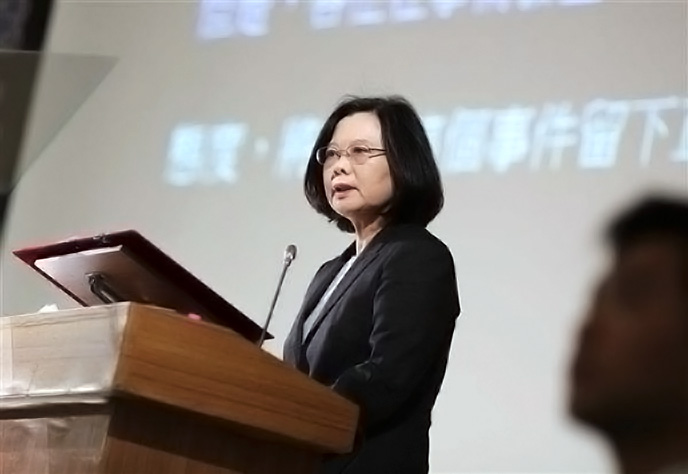
President Tsai Ing-wen at a 2017 International Holocaust Remembrance Day in Taipei, Taiwan. Via the Office of the President, Taiwan.
Last year, Taiwan’s vice president remarked, “Taiwan has much to learn from Israel and Germany on how they commemorate the Holocaust as it embarks on the path of transitional justice. From Israel, we can learn how to transform past suffering into educational resources to inspire tolerance and grace. From Germany, we can learn how to come to terms with the darkest chapters in our history and find the courage and determination to expose historical facts.”
This mention of transitional justice is an important one. Taiwan is in the process of addressing its own difficult history of injustices, such as the mass killings that took place in the 228 Incident and the White Terror era that followed from 1949 to 1987, when Taiwan was under martial law under an authoritarian government. Since taking office in 2016, President Tsai Ing-wen has made strong efforts to recognize minority groups and promote human rights, and ran her campaign on a platform of transitional justice, a process of redressing past human right abuses. In 2018 the Transitional Justice Commission was created, and in 2019 Taiwan legalized same-sex marriage, making it the first country to do so in Asia.
In writer Dror Mishani’s article on the Taiwan Holocaust Museum for the Israeli newspaper Haaretz, he asks:
Through the [Taiwan Holocaust Museum] and this story, is [it] also relating something about aboriginal history, about the history of Taiwan? Pastor Joe and his family of successor clerics belong to the indigenous peoples of Taiwan. In response to this question, Pastor Alex Cho, Pastor Joe’s son, explains, “We, too, had a holocaust and exile and conquest. And now we do not have independence. The Jews are our model.”
The Holocaust remains an important reminder about what people under the influence of dangerous ideology are capable of. This message is critical to our world today. With more action on human rights and transitional justice, and greater public awareness of atrocities like the Holocaust, Taiwan, and other places around the globe, can encourage a more understanding future.
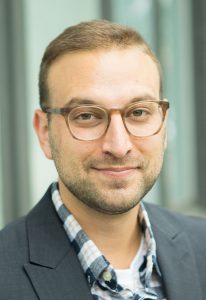 Eryk Waligora is a graduate student in the University of Washington’s Henry M. Jackson School of International Studies, where he is pursuing an M.A. in International Studies and learning Mandarin Chinese. He is also a graduate student at the UW School of Information, where he is pursuing an M.S. in Information Management with a focus on cybersecurity and disinformation. Before coming to the University of Washington, Eryk graduated from the University of California, Los Angeles (UCLA). He previously worked for several international tech startups in data research, as an Associate Producer at NBCUniversal, and for an international export company supporting East Asia new business development. During his graduate studies he has focused primarily on US, China, and Taiwan relations as viewed through the lenses of political economy, digital democracy, digital diplomacy, cybersecurity and disinformation. After graduation, he is looking forward to pivoting into a career in global cybersecurity strategy and consulting. Eryk is excited to be a Jewish Studies graduate fellow as a way to connect with other students around similar interests, explore connections in the national histories of Israel and Taiwan, and dive into the meaning of Jewish identity on a global scale.
Eryk Waligora is a graduate student in the University of Washington’s Henry M. Jackson School of International Studies, where he is pursuing an M.A. in International Studies and learning Mandarin Chinese. He is also a graduate student at the UW School of Information, where he is pursuing an M.S. in Information Management with a focus on cybersecurity and disinformation. Before coming to the University of Washington, Eryk graduated from the University of California, Los Angeles (UCLA). He previously worked for several international tech startups in data research, as an Associate Producer at NBCUniversal, and for an international export company supporting East Asia new business development. During his graduate studies he has focused primarily on US, China, and Taiwan relations as viewed through the lenses of political economy, digital democracy, digital diplomacy, cybersecurity and disinformation. After graduation, he is looking forward to pivoting into a career in global cybersecurity strategy and consulting. Eryk is excited to be a Jewish Studies graduate fellow as a way to connect with other students around similar interests, explore connections in the national histories of Israel and Taiwan, and dive into the meaning of Jewish identity on a global scale.

